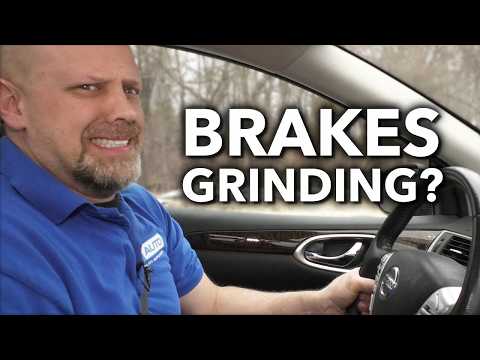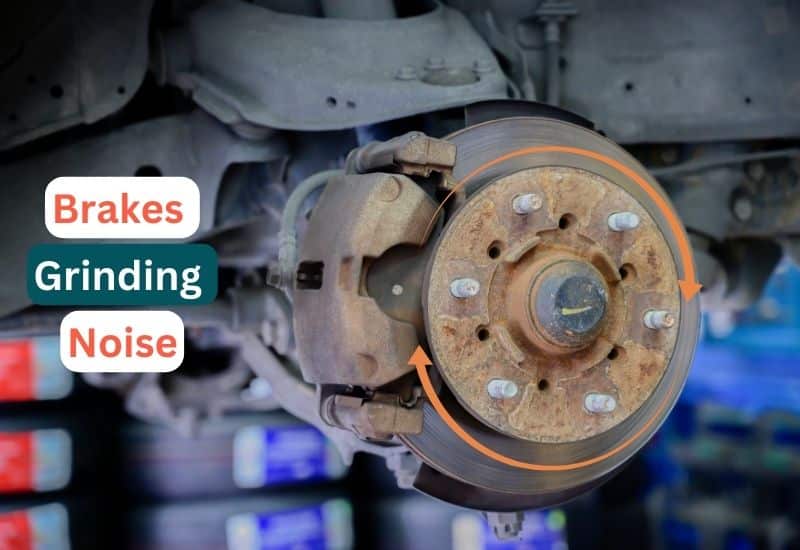
Normally, functioning car brakes are virtually quiet, allowing you to come to a gentle stop at traffic lights or smoothly pull up in your driveway.
Although some noise is expected due to the friction between the brake disc and brake pads, it shouldn’t be continuous.
However, if you’ve noticed a persistent metallic scraping sound emanating from your car when you press the brake pedal, it’s likely that your brakes are grinding.
Hearing your brakes make a grinding noise can send your pulse racing and your mind reeling as you start to worry about what could be wrong. When your brakes make a grinding noise, the first assumption is that you’re suffering from severe brake pad wear. Though, this isn’t the only potential problem, and it might not even be the most serious one.
Regardless of the cause, persistent screeching or loud grinding sounds often signal a serious problem with your vehicle’s braking system or a warning of potential issues ahead.
Even if your vehicle’s brake pads appear to be in good working order, it’s important not to ignore this problem, as driving with grinding brakes poses a safety risk.
To find out why your brakes are making a loud grinding sound, you’ll need to take the time to examine the potential causes of grinding brakes, understand what your brake system is telling you, and determine the best way to fix the issue safely and quickly.
How Do Car Brakes Work?
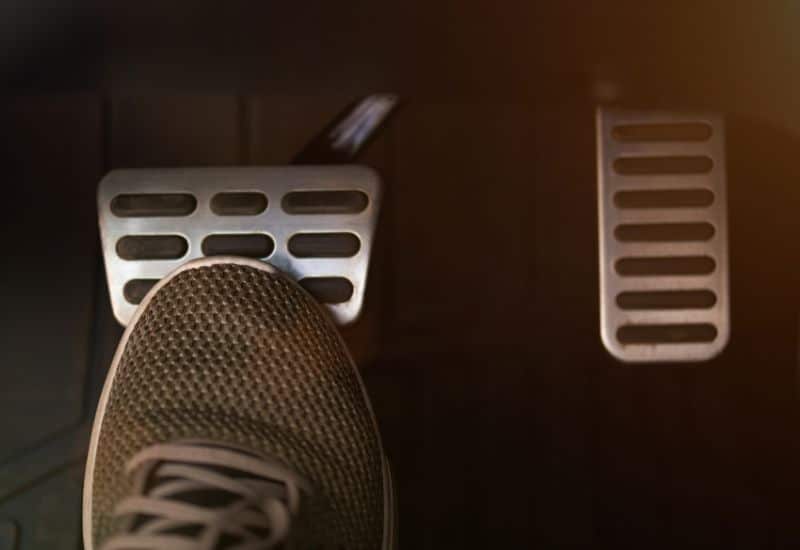
Modern-day car brakes use a sealed hydraulic system to transmit the pressure of you pressing the brake pedal to tell the brake calipers to close. As they contract, the brake calipers depress a series of brake pads onto the brake disc rotors of the wheels. This creates sufficient friction to slow the wheels and bring them to a stop within a reasonably safe distance.
When the brakes are making a grinding noise, it often means that something is abnormally affecting the rotors, resulting in severe friction. This is usually a sign that the brake pads are so worn down that the metal of the calipers is contacting the brake rotors. Though it’s certainly not the only potential problem that might be afoot with your car’s wheels or brake system.
How Grinding Brakes Affects Stopping Power
The stopping power of your car’s braking system relies on maximum friction and contact between the brake pads and the brake disc rotors. This often has the net effect of increasing the stopping distance.
When the brakes first start grinding, you might only notice the decreased stopping power when you’re slowing down from highway speed or if you need to stop suddenly. If the problem is allowed to persist without being fixed, grinding brakes will start to affect stopping power even at low speeds.
When your brakes are grinding, it’s the car’s way of telling you that there’s a problem with the brake pads, rotors, or both. Depending on the severity of the grinding noise and when it occurs, there could also be a problem with the calipers or other brake system components.
3 Main Situations That Could Lead to Brake Grinding
Here are a few situations where your brakes can make a grinding noise.
1. Brakes Grinding Noise When Your Vehicle Comes to a Sudden Stop
If your brakes are making a grinding noise when stopping suddenly, it’s likely a sign that the brake pads are wearing down. Especially if your stopping distance when slowing from highway speed seems increasingly longer.
If the brakes don’t make a grinding noise when slowing gradually, the problem might be limited to just worn-down brake pads. If you get them replaced as soon as possible, you might only be looking at the cost of the pads and maybe resurfacing, but not replacing the brake disc rotors.
2. Brakes Grinding When Driving
When brakes are making a grinding noise when driving, it’s a strong sign that the pads have worn to the point that there is metal-to-metal contact between the brake calipers and the brake rotors. Sometimes the surface of the caliper can become temporarily fused to the metal of the rotor and will make a hissing grinding noise that increases in cadence with the speed of the car when you take off from a stop.
In a scenario like this, the brake caliper could be seized and the pad is worn down. This usually requires you to replace all three components completely.
There are some exceptions to these symptoms. If your brake pads are relatively new, within 30,000 miles or less, and the brakes suddenly start making a grinding noise when driving, it could be a loose rock stuck between the pads and the rotors or another mechanical fault like bad wheel bearings.
3. Brakes Grinding When Stopping
If your brakes are making a grinding noise every time you stop or slow down, you likely have severe pad wear, which warped rotors might compound. If the car pulls to one side when they grind, it might also be a seized caliper.
The severity of the damage to the components will determine which parts need to be replaced. However, you should expect to need to replace the brake pads and rotors totally.
One possible exception here is rust on the brake pads and/or rotors. If you haven’t driven the car for a month or more, a slight patina of rust can develop on the pads and rotors. If you’re lucky, the rust will grind itself off without needing a major repair.
7 Reasons Your Brakes Are Making a Annoying Grinding Noise and How to Fix Them
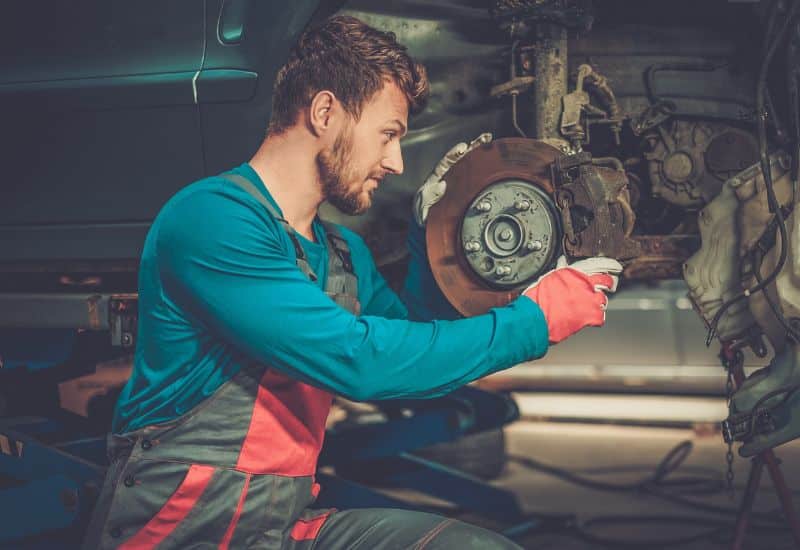
If you hear a harsh metal-on-metal grinding noise coming from your brakes when you slow down, come to a sudden stop, or even while driving at a constant speed, there could be several potential reasons for this issue. Possible causes for your brakes grinding include excessive brake pad wear, rocks and debris trapped in the brake caliper, bad wheel bearings, rusted or warped brake rotors, or insufficient lubrication of the brake hardware.
To make sure you’re troubleshooting and fixing the right problem, it helps to consider the symptoms of other potential brake grinding noises. Here are seven possible reasons why your car brakes are making a grinding noise and how to fix them:
1. Your Brake Pads Are Excessively Worn Down
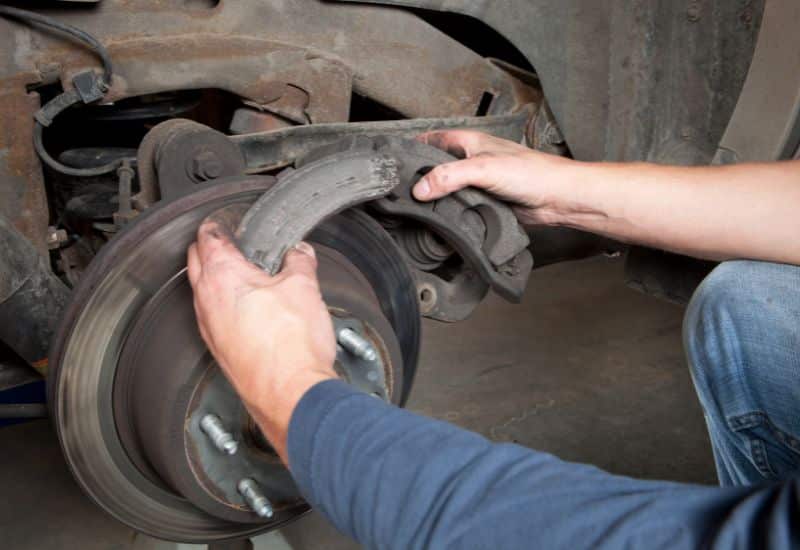
An excessive pad allowing the calipers or deformations in the pad to contact the rotors is one of the most likely reasons why your brakes are making a grinding noise. Brake pads are made from an amalgam of softer metal shavings like copper, steel, graphite, and brass that are all bonded together with a special type of resin. Every time the brake pads are compressed onto the rotors, a minuscule amount of the pad material is worn away by friction.
The average lifespan of a brake pad ranges from around 30,000 to 40,000 miles. The more stop-and-go city driving you do, or if you happen to tow heavy trailers in situations that require a lot of hard braking, the shorter your brake pad’s lifespan will be.
How to Fix Excessive Brake Pad Wear
If you catch it early, you might be able to stop the brakes from making a grinding noise by simply replacing the brake pads. Though this is usually only possible if it’s merely worn-down pads and there isn’t any warping of the rotors or damage to the calipers.
Replacing brake pads is something that the average home mechanic can do on their own. However, if the grinding damaged the rotors or too much material was lost from the brake calipers, then a total replacement might be necessary.
The cost to have a mechanic replace brake pads ranges from $120 to $300 per axle. This includes roughly $80 to $150 for parts. So, you can save up to $100 or more by replacing your own brake pads.
2. Rusted Brake Pads & Rotors
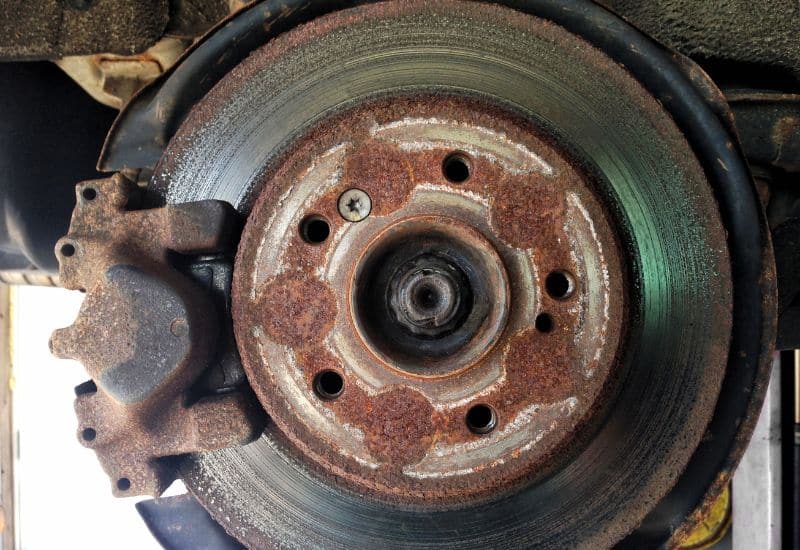
If your car has sat in storage for several months, it’s possible that a patina of rust on the brake pads and/or rotors can lead to brakes making a grinding noise. If the rust on the brake pads or rotors is minor, the rust will usually grind itself off in a hundred miles or so of normal driving.
It’s also quite likely for rusted brake pads and rotors also to affect the brake calipers. Sometimes, rust can infiltrate the moving parts of the caliper, causing it to not respond to the hydraulic pressure of the brake system. Rust on the caliper might also cause it to compress and essentially pin the brake pad to the rotor. This leads to rapid pad wear, which worsens the symptoms of brakes making a grinding noise.
How to Fix Rusted Brake Pads & Rotors
If the brakes are making a grinding noise due to severe rust from long-term storage and/or water damage, you might need to replace the pads and rotors. In this scenario, the rust runs so deep in the rotors that they become warped while the pads chip away.
3. A Seized Brake Caliper
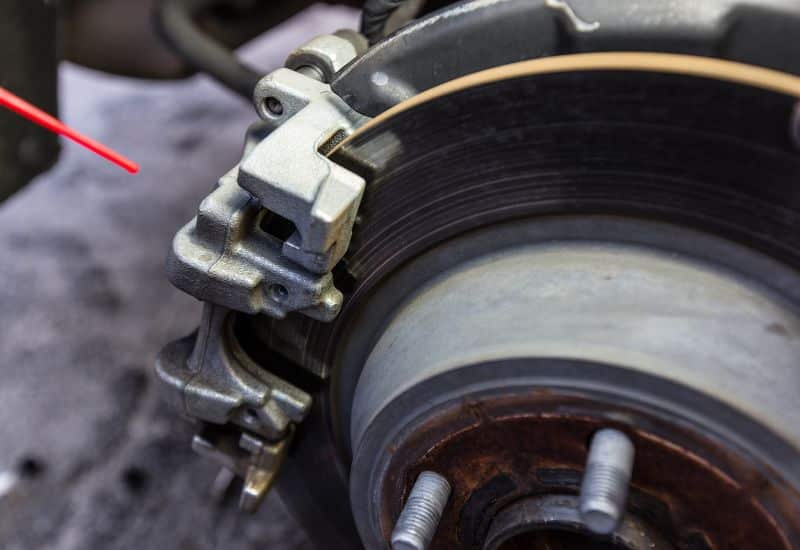
Brakes making a grinding noise when stopping can also be due to a sized brake caliper maintaining a modest amount of contact between the brake pads and the rotors. This is often attributed to improper brake caliper lube or missing shims separating the brake pad’s backing plate from the caliper piston.
A stuck brake caliper often manifests as the brakes making a grinding noise when stopping hard, and the car might pull to one side. Then, you’ll hear a gradual hissing or lighter grinding noise for 30 to 60 seconds after you drive away again.
How to Fix a Seized Brake Caliper
If the brakes make a grinding noise caused by a stuck brake caliper due to a lack of lubrication or a minor case of rusting, you might be able to fix it by lubricating the caliper. The average home mechanic with a modest skill level can do this independently.
However, if the stuck caliper caused warping on the brake rotors, then the rotors might also need to be resurfaced or replaced. This is something that the average home mechanic usually can’t do on their own. This is as simple as accessing the brake pads and lubricating all the caliper components.
Our Product Choice: Permatex 85188 Disc Brake Caliper Lube
Suppose the seized brake caliper is due to a mechanical malfunction or severe rusting, or the caliper is badly damaged due to prolonged grinding on the rotor. In that case, the entire caliper will need to be replaced.
The cost to have a mechanic replace the badly seized brake caliper ranges from $250 to $450.
Often, seized calipers cause brakes to make a grinding noise, though the caliper damages or warps the brake rotors.
4. Warped Brake Rotors
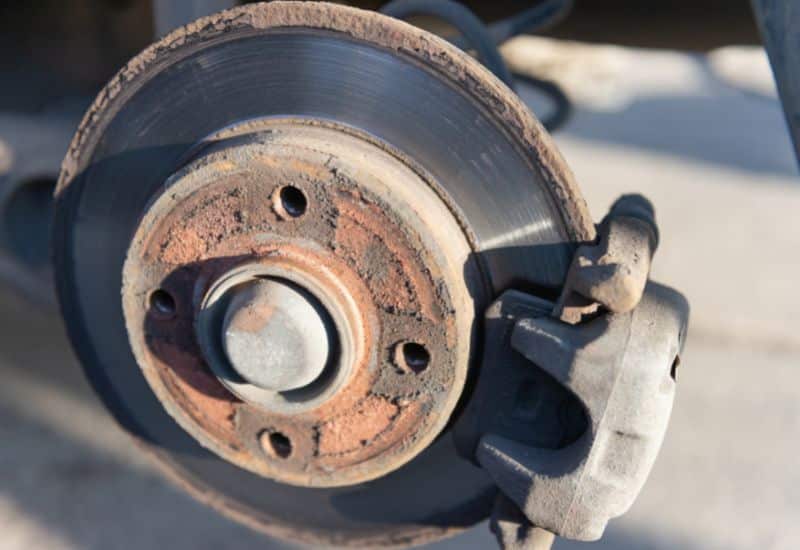
Warped brake rotors that cause inconsistent wear on the brake pads are another common reason brakes make a grinding noise. Different factors can cause this.
Sometimes, excessive heat buildup can cause warped rotors. This is often related to driving style and driving conditions. If you frequently have to tow heavy trailers or you have to drive in road conditions that call for frequent long periods of braking, the excess heat from friction can deform the metal, warping the brake rotors.
It’s also possible for new brake pads or misaligned brake pads to cause warped rotors. Here, the pad contacts the surface of the rotor at an improper angle, often causing grooves or other deformations on the previously smooth surface of the rotor. This is even more likely to occur with excessive brake pad wear and or a seized brake caliper that contacts the rotor.
How to Fix Warped Rotors
The damage to the rotor causing the brakes to make a grinding noise will determine whether the brake rotors can be resurfaced or need to be replaced entirely.
If you caught it early, a mechanic might be able to resurface the rotors. This calls for removing a minute portion of the rotor’s surface with a special brake lathe. The tools and skills required to do this are usually beyond what a home mechanic can do correctly.
The cost to have a mechanic resurface your brake rotors is around $150 to $225 per axle.
In a severe case where badly warped rotors are why the brakes are making a grinding noise, the rotors will need to be replaced. This almost always requires a total brake pad replacement as well.
The cost to have a mechanic replace your brakes and rotors can vary from as little as $250 to as much as $500 per axle. You generally need to have both axles repaired at the same time.
5. Debris Trapped in Brake Pads
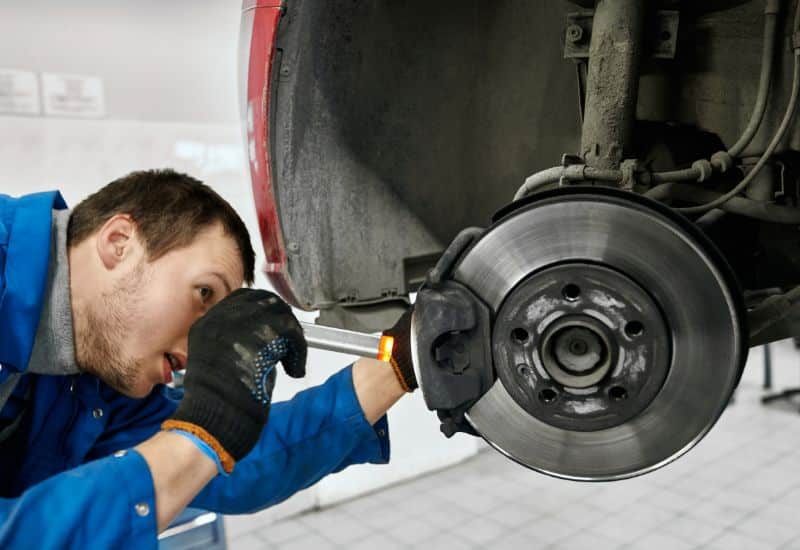
Sometimes, debris like a small rock or piece of gravel can get kicked up off the road surface and get stuck in between the brake pad and the brake disc rotor, causing brakes to make a grinding noise. This is usually the sort of thing that happens when you frequently drive on gravel roads, and you usually hear a disturbing shrieking sound along with the grinding noise when you brake. Most of the time, the bad sounds are limited to one wheel.
The larger concern here is that the trapped rock can do a lot of damage to the brake disc rotor in a very short amount of time. So, it’s best to stop and try to figure out if you can remove the debris.
How to Fix Debris Trapped in Brake Pads
Removing trapped debris that’s causing the brakes to make a grinding noise is often a game of hit-and-miss. Sometimes, you can just drive the car slowly back and forth in a parking lot, tapping the brakes to dislodge the rock. Sometimes, you need to take the wheel off to physically dislodge the offending item with a screwdriver or a butter knife.
Sometimes, a rock or piece of debris gets stuck too tightly between the brake pad and the brake disc, and you must take it to a mechanic. They can assess how much damage has been done to the brake system and the extent to which the brakes need to be disassembled to remove the debris.
The cost to have a mechanic release debris from the brake pads can be as low as $125. However, damage to the rotor and other brake system components can drive it up from there.
6. Faulty Anti-lock Braking System (ABS)
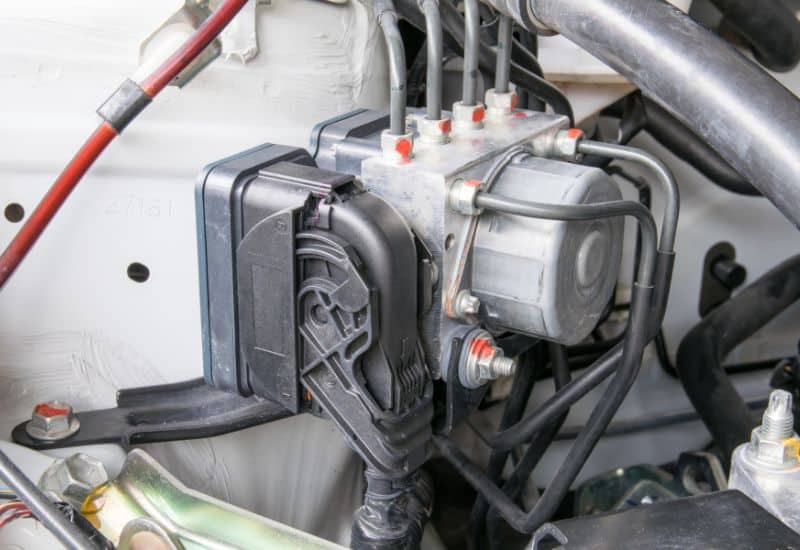
A problem with your car’s antilock braking system (ABS) controller might also be why your brakes are making a grinding noise. This is more likely to occur when you brake hard or for a long period of time on an icy surface. Then, as the brakes grind, you might also hear a buzzing sound. This might also indicate that your brake pads are wearing unevenly and may need to be replaced soon.
How to Fix a Bad ABS Controller
A bad ABS control module usually needs to be completely replaced and is something most home mechanics can’t do. Though usually, it also causes damage to other parts of the car’s braking system, which can cause the final repair bill to skyrocket quickly.
If you just need a mechanic to replace the ABS controller, you can expect the cost to range between $275 to $650.
7. Bad Wheel Bearings
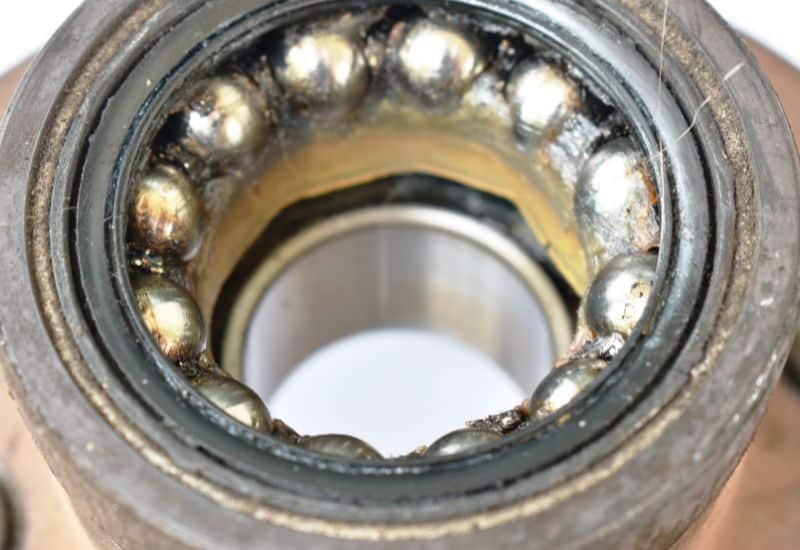
A bad set of wheel bearings that are worn out from excessive heat or wear and tear can lead to brakes making a grinding noise. However, this is actually the bearings grinding on themselves and/or the housing and or debris that’s gotten into the wheel when a bearing seal failed. The force exerted by braking simply makes the sound louder.
The sound of bad wheel bearings making a grinding noise when braking is usually just the start of a more serious problem. In time, the grinding or whirring sound of bad wheel bearings will become more constant. You’ll likely notice the whirring sound getting louder at higher speeds as well.
Wheel bearings tend to go bad individually, which means you’ll only hear the grinding noise on one side of the car in the front or back. Front-wheel bearings are also more likely to go bad than rear bearings as they tend to deal with more force and often more heat.
How to Fix Bad Wheel Bearings
When bad wheel bearings get to the point where the brakes are making a grinding sound, the bearings themselves need to be replaced. Your mechanic will likely also recommend replacing the hub itself. An average home mechanic might be able to do this on a trailer, but it’s best to have a professional mechanic replace the bad wheel bearings on a car.
The cost to have a mechanic replace bad wheel bearings ranges from $250 to $450 per wheel. However, some luxury brands might cost more.
Most of the time, you only have to replace one bad set of wheel bearings. Though you shouldn’t be surprised if the other wheel bearing on the same axle has a problem within 10,000 miles or so.
Is It Safe to Drive When Brakes Are Making a Grinding Noise?
Anytime brakes make a grinding noise, it’s a sure sign of a serious problem that is either starting or about to cause serious harm and might not be safe to drive.
If the car has been in storage for more than a month or two and the brakes grind immediately after you start driving it, it might just be brake system rust. The problem will likely go away after a few days of driving, which wears off minor surface rust.
Otherwise, you should beware that the grinding is a serious sign of a problem that will only worsen. In a severe case where extreme pad wear or damage to the rotors is a safety issue, a mechanic might not legally be allowed to let you drive the car on the road again until the brake system is fully repaired.
Why Do My Brakes Grind When Turning
If your brakes are making a grinding noise when turning, the brake linings have likely worn away to the point that the steel disc brake rotor is rubbing against the metal brake pad backing. This might also happen in conjunction with bad wheel bearings, and the car must be taken to a mechanic immediately.
Can A Seized Caliper Cause a Brake Fluid Leak?
Small brake fluid leaks under one wheel after you notice brakes making a grinding noise is a likely sign that the brake caliper has completely seized. At this point, the pressure in the brake lines is compromised and the car is unsafe to drive.
Conclusion
Brakes making a grinding noise are usually caused by excessive brake pad wear. If you catch it early, you might just have to replace the pads and perhaps resurface the rotors. The longer you procrastinate on the problem, the higher the risk is of serious brake failure due to warped rotors, a seized caliper, or bad wheel bearings.
If the brakes are making a grinding sound only when you brake hard, it might be that your pads are wearing low, and you simply need to have them replaced as soon as reasonably possible.
If you haven’t driven the car in several months, the brakes might make a grinding noise immediately as the rust wears off the rotors and/or the pads. Otherwise, they, too, might need replacing.

Written By
Jason Farrell
Jason Farrell is a certified master technician, the editor of Mechanic’s Diary in Pittsburgh, Pennsylvania. He is ASE (Automotive Service Excellence) certified and earned a Bachelor’s Degree in Automotive Technology from Pittsburg State University. With nearly 18 prior years of experience in the automotive field, he has extensive knowledge about Domestic, European, and other foreign makes and models of cars and light trucks. Jason’s experience working as a technician and service manager at dealerships, gave him the experience and know-how of most aspects of inspection, diagnosis, and repair from engine and drivability to electrical, HVAC, brakes, steering and suspension and everything in between.

